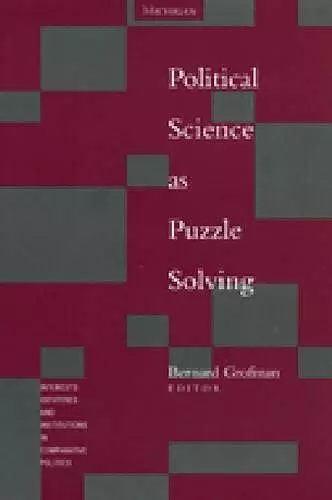Political Science as Puzzle Solving
Format:Paperback
Publisher:The University of Michigan Press
Published:4th Apr '01
Currently unavailable, our supplier has not provided us a restock date

Each of the essays in this volume addresses a particular empirical puzzle involving decisions or outcomes that, at least on the surface, seem difficult (if not impossible) to explain.
In the first three essays, the authors look at the behavior of an individual or an organization such as trade union or political party that, at first blush, does not seem to make sense: Why would a political leader gamble on a vote of confidence that he didn't need to call and the failure of which would seriously harm his party's future prospects? Why would a trade union conduct a strike that it knows it can't win? Why didn't the Japanese Socialist party modify its platform to attract more voters so as to give it a chance of holding power in Japan? The authors show that behavior that appears irrational is not really so once we understand the full context in which the behavior is embedded.
The fourth essay asks how a major empire--the Soviet empire--could have dissolved so quickly. Here the explanation involves an interesting new theory: the power of "decisive inaction." The final essay elaborates a formal model of equilibrium behavior in the social welfare system to consider the empirical puzzle of why increasing unemployment benefits often appear not to significantly increase the attractiveness of the unemployment option.
The contributors are Miriam Golden, Kaare Strom, Masaru Kohno, Richard Anderson, George Tsebelis and Roland Stephen.
Bernard Grofman is Professor of Political Science and Social Psychology, University of California, Irvine.
ISBN: 9780472087235
Dimensions: unknown
Weight: unknown
160 pages